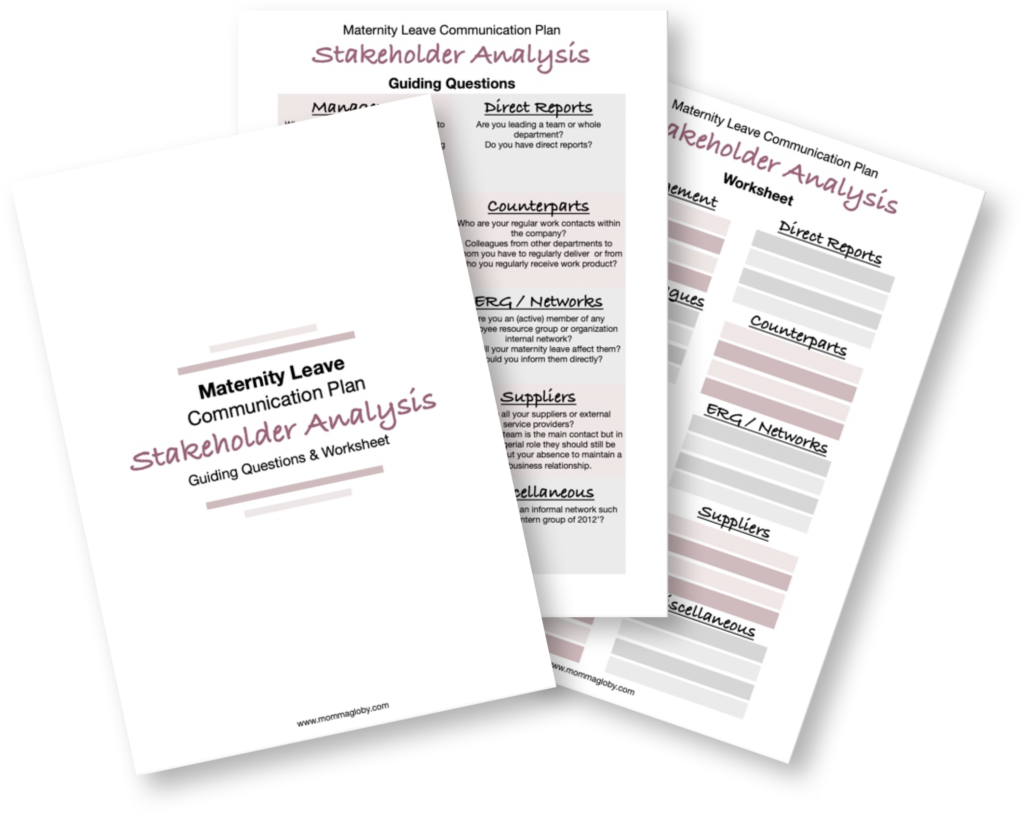7 Best Tips to Communicate your Pregnancy and Maternity Leave To Your Employer
Within the same month of my promotion to management level I found out that I was pregnant. Thanks to examples of female managers and executives going on and returning from maternity leave within my organization just months before I hardly worried. I jumped right to “how to make this work” and how to create a maternity leave plan my employer would love. I did a little online research for best practices. One career-driven momma-to-be (I wish I had kept the link to share the article with you) reported how she would treat her maternity leave like a project and only refer to it as ‘Q3’ (Quarter 3). This notion stuck with me and inspired how I approached handling my maternity leave the first time. Both going on and returning from maternity leave worked seamlessly so that I followed the same steps the second time I got pregnant.
7 Best Tips for your pregnancy and maternity leave announcement at work
Here are 7 tips to help you prepare your pregnancy announcement at work.

Tip 1: Take Your Time
You just found out you are pregnant. Congratulations! This will mean a big change in your life is coming up. One that will also affect your career. You will not be showing for a good few months so there is no need to rush the communication to your employer. Take a moment to take in that a tiny human has started growing inside your belly. Then start thinking about how you want to handle your pregnancy, upcoming motherhood and work – with yourself, with your partner and anyone else you feel like sharing it with. Finally, communicate it to your employer.
Miscarriages are unfortunately more frequent than I ever imagined. Give yourself the time to get to the safer zone of the end of the first trimester.
Tip 2: Get Ahead Of It
Chances are people will ask you a lot of questions and give you a lot of opinions once you tell them you are pregnant. Your private circle might start asking questions about what kind of birth you are planning while colleagues and your employer will ask about your plans for maternity leave. You do not need to have all the answers right away. Get ahead of the questions though by looking into your legal rights and obligations, rules and regulations around pregnancy and maternity leave from your employer, etc. You will feel more at ease when bombarded with questions if you at least have heard of it before and can reply with a general answer of “I’m currently looking into this” or the like.
Moreover, you want to get ahead and be able to ask your questions about your options as well. Many career mommas before us have paved the way but if the present options don’t work for you, feel encouraged to explore with your employer how to make them happen.
Lastly, if your supervisor and HR have never dealt with a pregnant employee you might have to do a little more preparation for your maternity leave and guide them through the process.
Tip 3: Make A ‘Who Needs To Know’ List
Being pregnant means that you will take some time off work and stakeholders need to be informed about your absence. Your supervisor and direct colleagues are obvious – and direct reports if you have any. Look further to prepare a seamless transition into your maternity leave. Who are your daily contacts for your area of responsibility? Are you the only person on a mailing list to then share it with your team? Who are your customers? Who in your organization should you tell in person based on your relationship rather than them finding out through the grapevine? Once you have prepared your overview of who needs to be informed you can start thinking about the timing. Depending on your organization’s culture and hierarchy you want to have a ‘communication plan’.
Don’t Miss Anyone!
Get the Maternity Leave Communication Plan Stakeholder Analysis Workbook to prepare your maternity leave like a boss from the beginning. With 20 guiding questions and a worksheet you will not miss anyone!

Tip 4: Find The Right Time
Now that you know who you want to inform, find the right timing. Factors to take into consideration are your organization’s culture and hierarchy, the interdependencies of communication and the individual timing for each stakeholder.
With regards to your organizational culture you want to think about how risk-averse and it is. Japan is a very risk averse country which also shows in the organization’s culture and communication style. The biggest amount is focused on pre-information so that everyone can prepare. Therefore, I chose to start informing my stakeholders right after the first trimester. This allowed them time to process the information, ask questions they had and prepare for my absence.

My organization is fairly hierarchical. It is common for executives to receive important news first and then share it with the lower levels of management and staff. That is why I decided to inform my boss boss first, then my boss and finally my direct reports. This order gave me the chance to discuss ideas for how to handle my absence with my boss already and have an idea when my direct reports asked me about it at the time I informed them.
When designing your pregnancy ‘communication plan’ you should think about the interdependencies of colleagues and supervisors and who communicates with who. You don’t want your boss to find out about your pregnancy from a customer e.g. Not for the sake of your relationship and not for the sake of the professional appearance of your team or department.
Choose the right time to inform your individual stakeholders based on your relationship and usual working style with them. I was reporting to two boss bosses when I got pregnant. One of them was not deeply involved in my daily operational work, not much older than me and had a more casual style. Therefore, I just spontaneously asked if I could talk to him for a few minutes when the break during a workshop started. With my other boss boss and boss, I chose to communicate it during one of formal 1:1 meetings. If you don’t have standing meetings with some of the stakeholders remember to schedule a meeting if a written information would not be sufficient or not appropriate.
Tip 5: Be professional
When you communicate your pregnancy and maternity leave to your employer, remember that this is your employer. Focus on the information that is important for your employer to know. When is your expected due date, when will you be starting maternity leave and when do you plan to come back. Leave all the pregnancy and baby talk for your close friends and family, unless your conversation partner opens the conversation towards those topics.
Whenever I talked to my boss about my pregnancy or maternity leave I stayed professional, focused on the dates or things that had to be organized for it. He was nice to show some interest and when he asked about how I was or later how the baby was doing I was happy to talk about it. Always mindful of the meeting time we had and topics that had to be addressed.

Tip 6: Present A Solution, Not A Problem
For you, being pregnant means a huge change in your life, an amazing journey ahead for you, a miracle growing inside of you. For your employer, however, it is a nuisance. Your manpower will be missing for the duration of your maternity leave, tasks will have to be restructured, knowledge will have to be shared. If you are career driven going on maternity leave can be a great opportunity to show managerial qualities. As a manager, you have to structure tasks, delegate them, monitor them, etc. Prepare a maternity leave plan that shows your sense of responsibility and how tasks and projects could be handled during your absence. Managers will most likely want to have a say in how things will be handled during your absence. A good proposal regarding the details will be very appreciated and seen as you being a responsible and pro-active employee.
Tip 7: Address Your Return
Maternity Leave is temporary. Therefore, do not forget to address the time of your return. Not everyone is aware of the length of the legal entitlement for maternity leave. Will you take the time you are legally entitled to or a shorter time? Will you go on child care leave after maternity leave? The duration of your absence will make a difference for how your absence needs to be prepared.
Besides the time of your return, align how you will stay in touch during your absence. Are there any requirements to report back to work at a certain point in time? Who is your contact, your supervisor or HR?
Conclusion
If you are career driven having to take time off work might seem scary as to what it will do to your career. Instead of worrying about it, turn it into an opportunity of how well and professionally you prepare for it. This starts with how you inform your employer.
Communication is very individual. It depends on the message, the sender and receiver. You do not want to change your style of communication when you announce your pregnancy and maternity leave. Therefore, take the above tips and adjust them to your organization, its culture and the relationships with your supervisor and colleagues.






